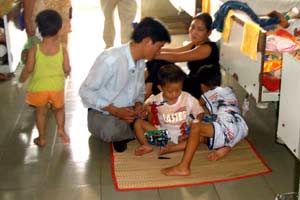When 6-year-old Pham Quoc Hien from Tan Phu, Ho Chi Minh City, experienced a seizure, his parents placed a hard object in his mouth to prevent him from biting his tongue. As a result, one of his teeth went “missing.” This tooth ended up “visiting” his left lung for over 10 days without anyone knowing.
 |
| Inpatient at the ENT Department of Children’s Hospital 1 (Photo: VNE) |
Afterwards, Hien was taken to the neurology department of Children’s Hospital 1 for treatment. Here, his father asked the doctor where the broken tooth could have gone since they couldn’t find it externally. The neurologist transferred Hien to the ENT department to check for foreign objects in the respiratory tract.
Although the patient showed no symptoms related to ENT issues, the doctor proceeded with an endoscopy to locate the tooth. They had to perform X-rays and endoscopies three times before they finally found it in the left lung. At this point, the broken tooth had caused the lung to swell and become infected with pus.
According to Dr. Dang Hoang Son, head of the ENT department at Children’s Hospital 1, this is the first reported case of a patient with epilepsy who has broken a tooth that then fell into the lung. The right lung is sloped, while the left lung is level; typically, foreign objects would fall into the right lung. However, in this case, the object fell into the left lung, which surprised the doctors.
The doctor advised that when a child has a seizure due to epilepsy, parents should loosen the child’s clothing for comfort and position the child in the easiest breathing posture. If the child is breathing evenly, not bleeding, and the teeth are tightly closed, there is no cause for alarm. Parents should simply monitor the condition; if the seizure lasts for an extended period, they should take the child to the hospital. Absolutely do not pry open the child’s mouth with hard objects, and do not squeeze lemon juice into the child’s mouth to stop the seizure as is commonly believed. This can cause choking, and the child could inhale lemon seeds or other foreign objects into the lung, leading to swelling, inflammation, or pus development in the lung. Cases of pneumonia like this are often difficult to diagnose.
Vo An


















































